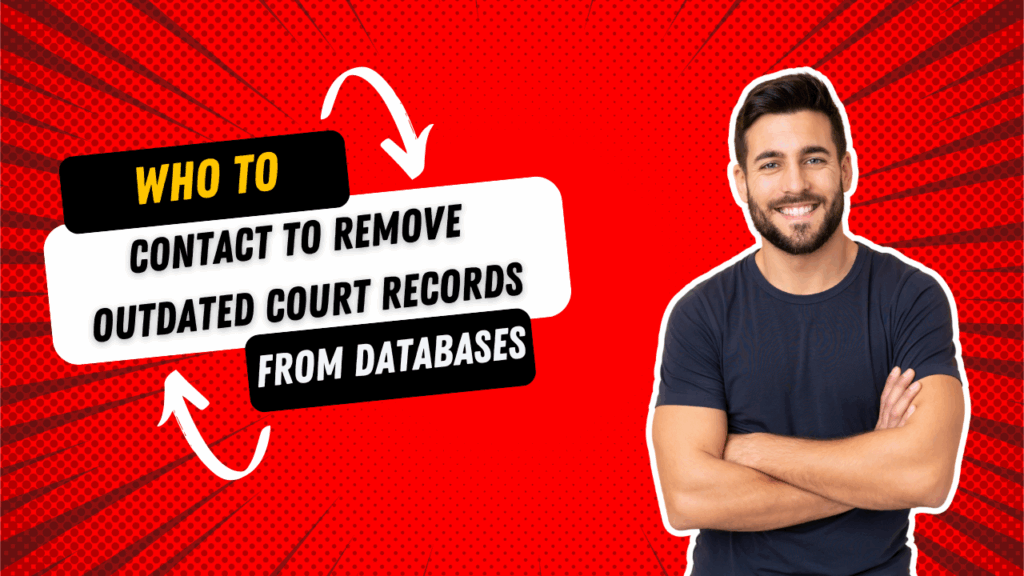Old court records can still pop up online long after the case is closed. Even if the charges were dropped or dismissed, your name might still be listed on search engines, people search sites, or background check reports.
Old court records can still haunt you when they show up in online databases. But you have ways to fight back. Here is a step‑by‑step plan to help you remove them.
Dig Deeper: How to Remove Court Records from Google Search
What Counts as an Outdated Court Record
Some courts drop charges or dismiss cases after completion or acquittal. These records may remain in public databases. Background check sites may list your name alongside an old case even after it’s no longer valid.
One study showed that about 20% of online background checks contained wrong or outdated legal information. That’s a lot of people being hurt by dead records.
Who You Should Contact
Court Clerk or Court Administrator
They are your starting point. These officials hold the official records.
Obtain certified documents such as:
- A dismissal order
- A sealing or expungement order
- A certificate of disposition or case closure
Certified copies are essential. They prove the case is no longer live. These documents become your evidence for removal requests.
The Website Hosting the Record
These could be publicly available courtroom websites or third‑party aggregators like Justia, CourtListener, or public record directories.
- Visit the site.
- Locate “Opt‑out,” “Contact,” or “Data removal” pages.
- Provide:
- Your full name and case number
- The URL showing the outdated record
- A copy of the certified court order
Repeat the process for each site. Many are quick to remove outdated entries once presented with proof.
One caller told us, “I emailed three aggregators with my dismissal order. Two acted within a week. The third took fifteen days, but it finally came down.”
Background Check and Consumer Reporting Agencies
These sites are used by employers, landlords, and lenders.
Examples include:
- TransUnion SmartMove
- Experian RentBureau
- CoreLogic
- Tenant screening services
Under the Fair Credit Reporting Act (FCRA), you can dispute outdated or incorrect entries.
Steps to follow:
- Request a free copy of your report.
- File a dispute.
- Attach your certified court documents.
- Wait up to 30 days for resolution.
Include a cover note:
“My case was dismissed on MM/DD/YYYY. Please update or delete the entry.”
Often the report will be corrected or removed completely.
Google and Other Search Engines
Even if a page is removed, search results may still appear.
Use Google’s Remove Outdated Content tool:
- Paste the URL of the removed page
- Upload proof (for example, screenshots or certified orders)
Google reviews and generally removes these results within a week or two.
Web Hosts or Abuse Contacts
Some websites ignore removal requests.
They host on services like:
- GoDaddy
- Bluehost
- HostGator
Use a WHOIS lookup to find the host’s abuse contact. Email them:
- The URL to be removed
- Proof the content is outdated
- A copy of the court order
Many hosts have terms against storing outdated personal info. They may pull the page immediately.
State Attorney General or Consumer Protection Offices
Some states ban unscrupulous removal fees or outdated court listings. A couple even force sites to remove old criminal records.
If removal requests fail:
- File a complaint with your state’s attorney general
- Describe the site’s refusal
- Attach proof of dismissal
State pressure can force compliance, especially when laws are in the site’s favor.
Reputation Management Services
If you’re pressed for time or overwhelmed, professional help may be wise.
For example, Top Shelf Reputation specializes in:
- Finding all outdated court listings
- Contacting sites on your behalf
- Monitoring results over time
- Ensuring removed content stays offline
This may come with a fee, but it can save you time and hassle.
Step-by-Step Removal Plan
- Search your name on Google, Bing, DuckDuckGo
- Get certified court orders from the court clerk
- Send removal requests to each site and aggregator
- Dispute with background check firms under FCRA
- Use Google’s removal tool to clear search results
- Contact web hosts if sites refuse to act
- File a state complaint for persistent violations
- Hire a reputation service if it’s too much to handle
Timeline You Can Expect
- Certified court orders: 1–7 days
- Aggregator site removal: 3–21 days
- Background check updates: 14–30 days
- Search engine removal: 7–14 days
- Web host takedown: Varies widely
- State complaint resolution: Several weeks to months
Final Tips to Stay Ahead
- Keep email receipts and screenshots
- Follow up weekly if you get no reply
- Use the correct legal names and case numbers each time
- Clean up search results regularly every few months
Final Thoughts
You have more power than you realize when it comes to outdated court records. Start with official documents, send clear requests, file disputes, and follow up until the job is done.
You deserve to be judged on who you are today. With the right steps, you can make sure old court records don’t hold you back.
Need help? Top Shelf Reputation specializes in managing court records online, even when they can’t be fully removed. Contact us today to take back control of your online image.

